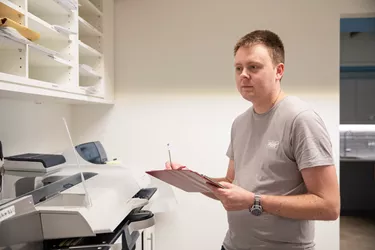Why management needs mental health training
Krishna blogs about the importance of mental health training for employers. She is one of our experts by experience, and talks about her own experiences of mental health and answers questions at Mind training sessions.
The notion of a 'normal' and ‘high performing’ employee is a myth, particularly as mental health affects 1 in 4 people each year in the UK. Everyone experiences difficult times in their life where they struggle to cope with events and this has an impact on their ability to work. I was one of those and struggled tremendously to cope with my depression and anxiety at work.
I was very young when I first realised that I had mental health problems which I hid from pretty much everyone around me. It wasn’t until I started working that I realised that I was really struggling.
I went through several different employers but I was afraid to reveal my history to any of them. I didn’t want to have a mental health problem. I wanted to be ‘normal’ like everyone else was because I hated how it made me feel; alone, unlovable and strange.
My anxiety made it difficult for me to socialise, to open up to anyone, to connect with people and to concentrate at work. I lost my self-confidence and my self-esteem plummeted, which resulted in me constantly questioning myself and my abilities. It was at this point that I started self-harming.
The depression I experienced was like a dark cloud which would slowly creep up on me and hover above me. It exhausted me, I felt useless, low, tearful and empty. I lost the ability to enjoy my life or take pleasure in the things I usually did. I found I was very restless.
There were some things at work that I found particularly difficult at this time which all my employers and colleagues picked up on. I realised that I was no longer going to be able to hide this so I went to speak to my bosses. The reactions I received were very much similar across the different companies I worked for.
One of my employers said my sickness was starting to become a nuisance, affecting team productivity and giving the company a bad name. I was given three options: return to work, face dismissal or resign. My employer was not being supportive, and I was not ready to return to work so I resigned.
I feel strongly that adequate mental health awareness training would have helped me and management to identify areas where I needed support and helped me keep my job. Better understanding and bespoke support would have allowed me to balance my work life and my personal life.
I started a new job after a few months of being at home. This one was in the mental health sector as a support worker where I assumed that I would receive the right kind of support and understanding from colleagues and management. Unfortunately, only two weeks into my new job I was struggling and my colleagues and management again offered no support.
Later in the month my manager felt it necessary to tell me she didn’t feel that I could cope emotionally with this job and that perhaps I should look for something else. It was at this point that I felt I needed to seek out support.
Thanks to counselling and group therapy I found ways of coping. It was through therapy that I learnt to recognise my limitations and use them as stepping stones to better my life rather than as flaws which were holding me back.
I also accepted that sometimes I need to give myself time until I feel a lot better before entering work and when I feel confident and well enough to work, the fact that I have a history of mental health problems shouldn't be a barrier for me to succeed.
As an expert by experience I have gained a great deal of confidence in being able to share my story with a wide audience of people on Mind training courses. The reactions have been overwhelmingly positive and I have been received with understanding and a genuine interest to know what its like to live with a mental health problem.
I have seen an attitude shift in the way the people see those with mental health problems but a lot more work needs to be done because this shift only appears to be in employers and professionals rather than the general public.
I have been very moved and inspired by many mental health professionals sharing their own experiences of mental illness, which was another reason to be become an expert by experience.
These people have contributed tremendously to the field of mental health, regardless of their own experiences and have used their experiences positively to go beyond what is already known about mental health problems. It's something I hope to be a part of, going into the future.


Information and support
When you’re living with a mental health problem, or supporting someone who is, having access to the right information - about a condition, treatment options, or practical issues - is vital. Visit our information pages to find out more.
Share your story with others
Blogs and stories can show that people with mental health problems are cared about, understood and listened to. We can use it to challenge the status quo and change attitudes.

















